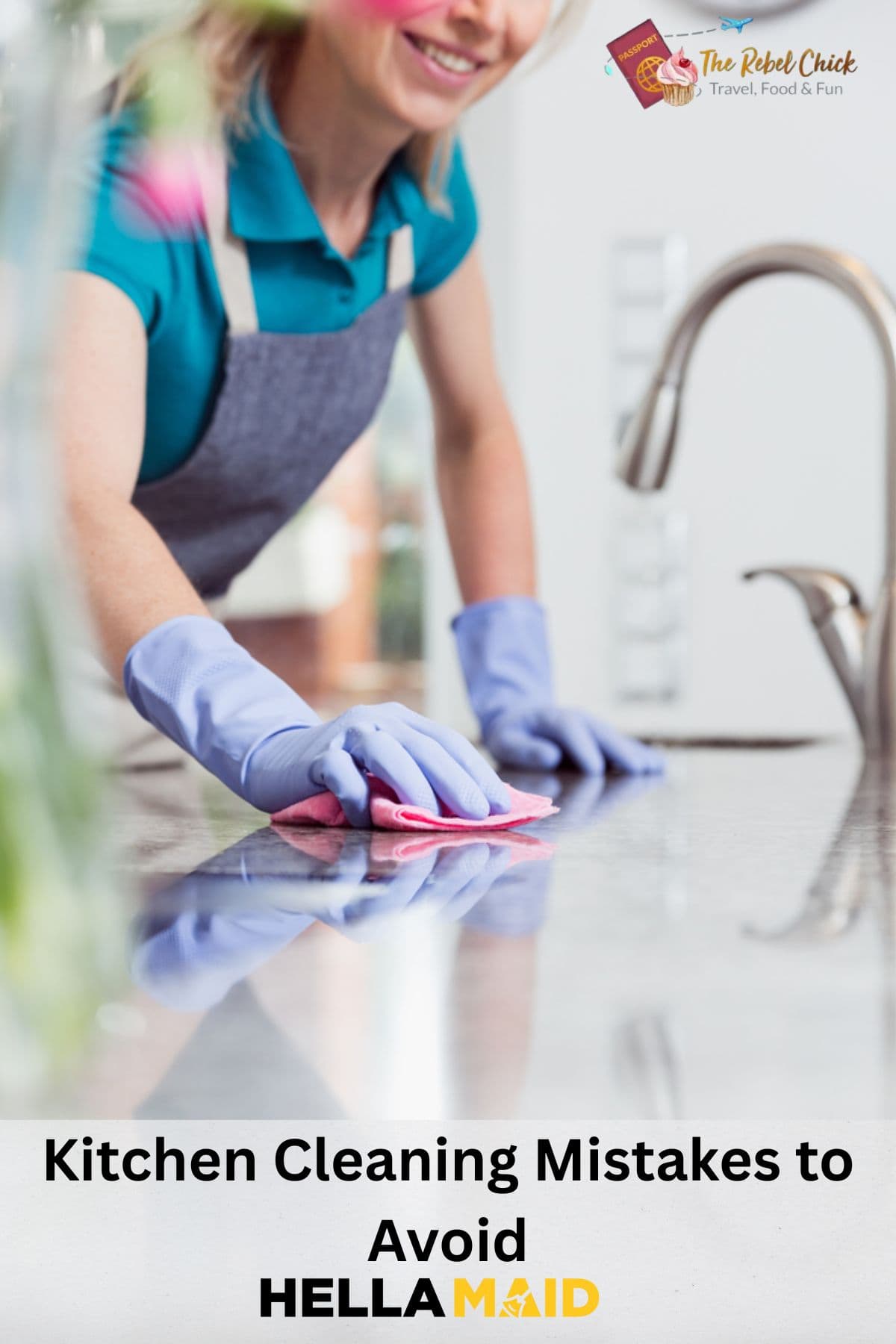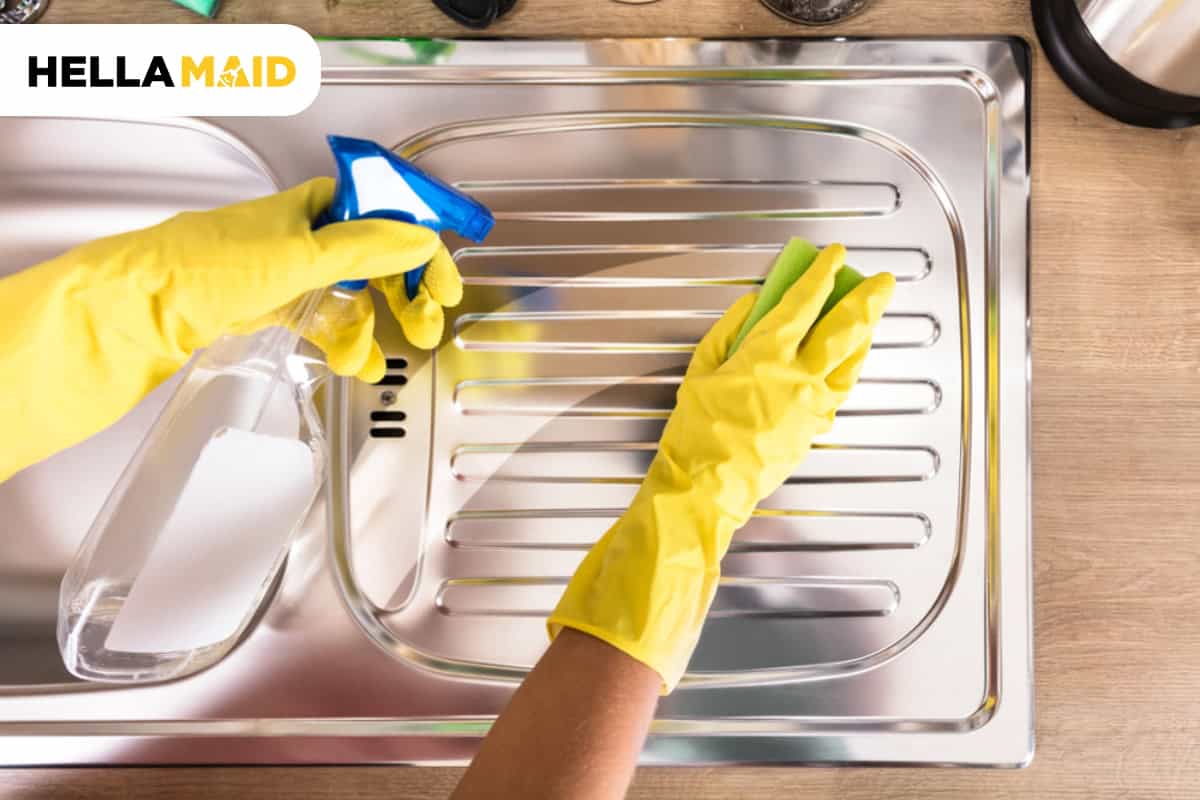Cleaning your kitchen properly is one of the most important tasks in maintaining a safe, hygienic, and welcoming home. Whether you’re cooking up a family meal or just cleaning up after breakfast, the kitchen sees a lot of action. But sometimes, the ways we clean can cause more harm than good. To make sure your kitchen remains in tip-top shape, let's go over the most common kitchen cleaning mistakes and how you can easily avoid them. If you’re looking for a more hands-off approach, professional house cleaning services Austin can help with thorough deep cleaning when needed.

Using the Wrong Cleaning Products on Sensitive Surfaces
Mistake:
When cleaning countertops, sinks, and other kitchen surfaces, it's easy to grab any product that promises to clean. However, not all cleaning products are suitable for all surfaces. Harsh chemicals can cause damage, especially on delicate countertops like granite or marble or on stainless steel appliances. Over time, abrasive cleaners or chemicals can cause discoloration, streaking, or even etching in some materials.
How to Fix It:
Before using any cleaner, check the manufacturer’s guidelines for your kitchen surfaces. For example, granite countertops should be cleaned with a gentle, pH-balanced cleaner to avoid dulling the stone. Use a microfiber cloth, which is less abrasive and more effective at cleaning, on most surfaces. For stainless steel, a specialized cleaner will keep the surface free of streaks and marks without damaging it. You can also make your cleaner by mixing vinegar and water or using mild dish soap.
Why It Matters:
Choosing the right cleaner extends the life of your kitchen’s surfaces, preventing costly repairs and keeping them looking new. Proper cleaning ensures that your kitchen remains safe for food preparation and avoids contaminating food with harmful chemicals.
Neglecting to Clean Behind and Under Appliances
Mistake:
It’s easy to forget about the areas behind or underneath appliances like refrigerators, stoves, and microwaves. These areas collect dust, food particles, and even grease, which can lead to odors, pests, and an overall messy kitchen. Grease can also build up, creating a potential fire hazard if left unchecked.
How to Fix It:
Make it a habit to clean behind and underneath your appliances every few weeks. Simply pull out your fridge or stove, sweep up crumbs, and wipe down the floor with a damp cloth or a cleaning solution. If you have a vacuum with a hose attachment, this makes cleaning easier and more thorough. For hard-to-reach areas, consider using an extendable dusting tool to get behind your microwave or refrigerator. For the stove, use a degreaser or vinegar and water solution to wipe away accumulated grease.
Why It Matters:
This habit prevents dirt buildup, reduces the chance of pest infestations, and keeps your kitchen fresh and clean. It also ensures that your appliances are working efficiently and reduces any risk of fire caused by grease buildup.
Ignoring the Trash Can
Mistake:
Most people focus on cleaning surfaces in the kitchen and forget about the trash can, which can become a source of lingering odors and bacteria. Dirty trash cans can even lead to mold growth and unpleasant smells that permeate the kitchen. Neglected trash can also harbor harmful bacteria, especially if it’s used for food scraps or raw meat packaging.
How to Fix It:
Regularly wash out your trash can with warm water and soap, paying attention to the lid and edges where spills often occur. You can also sprinkle some baking soda at the bottom to neutralize odours and wipe it down every time you change the bag. For extra freshness, consider using trash bags with odor-neutralizing properties. For tougher stains, use a disinfecting cleaner or a mixture of vinegar and water.
Why It Matters:
A clean trash can is essential for keeping your kitchen odour-free and sanitary, especially when you handle food. It also helps prevent bacteria and mould from growing, contributing to a healthier home environment.
Not Cleaning Your Dishwasher
Mistake:
While your dishwasher is designed to clean, it still needs regular maintenance to keep it functioning properly. Leftover food particles, soap scum, and grease can accumulate inside the dishwasher, leading to unpleasant odours, reduced performance, and even mould growth. Over time, this buildup can also make your dishwasher less effective at cleaning your dishes.
How to Fix It:
Clean your dishwasher once a month by wiping down the interior, including the door and seals. Remove and clean the filter to get rid of any food debris. Run a cleaning cycle with a dishwasher cleaner or a cup of white vinegar to eliminate odours and buildup. For the dishwasher's exterior, use a soft cloth and mild cleaner to remove smudges and grime. Also, leave the door slightly ajar after each use to allow the interior to air out and reduce moisture buildup.
Why It Matters:
Regular cleaning ensures that your dishwasher works efficiently and keeps your dishes spotless while also preventing bacteria growth. It also prolongs the lifespan of your appliance, ensuring it continues to serve you well for years.
Overlooking the Kitchen Sink
Mistake:
The sink is where you wash dishes, rinse produce, and handle raw meat. If not cleaned properly, it can harbour bacteria and germs, especially around the faucet and drain. Food particles, soap scum, and grease buildup in the sink can also lead to unpleasant odours and attract pests.
How to Fix It:
After each use, give your sink a quick rinse with hot water. Once a week, clean your sink with a gentle, non-abrasive cleaner. Use baking soda to scrub away stains and vinegar to disinfect the drain and faucet. Don’t forget to wipe the faucet handles, which can collect grime from hands and food. For tougher stains, use a mix of lemon and baking soda to remove discolouration without damaging the surface.
Why It Matters:
A clean sink is crucial for maintaining a hygienic kitchen, especially since it’s used for so many food preparation tasks. Proper cleaning reduces the risk of cross-contamination and keeps your kitchen safe for food handling.

Washing Dishes the Wrong Way
Mistake:
If you’re washing dishes by hand, you might be doing it wrong without even realizing it. Leaving food residue on dishes, using a dirty sponge, or not sanitizing your dishcloth can all lead to bacterial contamination. Using the same sponge or cloth for too long can spread germs back onto your clean dishes.
How to Fix It:
Before washing, rinse off dishes to remove excess food. Use a clean sponge or dishcloth each time, and sanitize it regularly by microwaving it for 30 seconds. Also, don’t stack dishes while they’re wet. This encourages bacteria to grow and leads to water spots. If you’re washing a large number of dishes, make sure the water is hot enough to clean effectively. For added sanitation, add a few drops of dish soap with antimicrobial properties.
Why It Matters:
Properly cleaning dishes helps maintain hygiene in your kitchen and reduces the risk of cross-contamination. It also ensures that you are washing with the most effective tools, preventing any unwanted germs from spreading.
Forgetting to Clean the Oven and Range Hood
Mistake:
Spills from cooking can quickly accumulate in your oven and on your range hood, leading to stubborn stains, grease buildup, and unpleasant odours. Left unchecked, this can even become a fire hazard. An oven or stovetop that isn't cleaned regularly can also impact the flavour and quality of your food, as old grease and food residue can cause unpleasant odours when cooking.
How to Fix It:
Regularly wipe spills off your stove while they’re still fresh. Deep clean your oven once every few months by removing the racks and using a non-toxic cleaner. For your range hood, wipe it down after every cooking session and clean the grease filter every couple of months. For tougher grease buildup, a solution of vinegar and water can help break it down. If you have a self-cleaning oven, make sure to use that function periodically to keep it in top shape.
Why It Matters:
Keeping your oven and range hood clean helps your kitchen function safely and efficiently while also preventing greasy buildup that could affect air quality. Regular cleaning also helps avoid fire hazards and keeps your cooking environment fresh.
Using Too Much Cleaning Products
Mistake:
It’s tempting to pour on the cleaner to get the job done quickly, but using too much product can leave behind residue and streaks on your counters and appliances. Overusing cleaners doesn’t make things cleaner. It just creates more work and waste.
How to Fix It:
Always follow the instructions on the product labels for the correct amount. If using a spray cleaner, one or two squirts should be enough. If your surface is still greasy or dirty, reapply only a small amount rather than dumping on more products. For large surfaces like countertops or floors, dilute the cleaner in water as per the label instructions to avoid leaving excess product behind.
Why It Matters:
Using less clean not only makes your kitchen cleaner and streak-free but also saves you money, minimizes waste, and reduces the number of chemicals you use in your home.
Bonus Tip
Bonus:
While cleaning your kitchen, it’s easy to forget about other areas in your home that also need attention, like the bathroom. If you're unsure how to clean a bathtub, a simple solution is to use a combination of baking soda and white vinegar. Sprinkle baking soda generously around the tub, spray with vinegar, and let it sit for 15 minutes. After scrubbing, rinse with warm water to reveal a sparkling clean tub.
Final Thought
Cleaning the kitchen is essential for maintaining a healthy and pleasant space. By avoiding these common kitchen cleaning mistakes and implementing simple fixes, you can keep your kitchen looking great and functioning at its best. Regular cleaning habits, proper tools, and attention to detail will make your kitchen a safe, hygienic place for food preparation and family time.
Take the time to correct these common mistakes, and you’ll not only enjoy a cleaner kitchen but also a healthier, more efficient space that serves your needs for years to come. With these easy changes, you can maintain a spotless, functional kitchen that you’ll love spending time in.





Leave a Reply